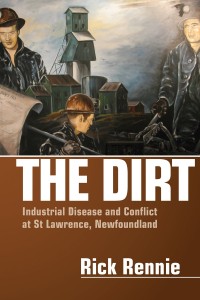Oral History Forum Review of The Dirt

The Dirt
Industrial Disease and Conflict at St. Lawrence, Newfoundland
Kyle Franz, “Review of The Dirt: Industrial Disease and Conflict at St. Lawrence, Newfoundland by Rick Rennie” Oral History Forum d’histoire orale 30 (2010), Special Issue “Talking Green: Oral History and the Environment”
Review Kyle R. Franz, Queen’s University
With The Dirt, historian Rick Rennie seeks to revise, at least to some extent, the narrative that for decades has defined St. Lawrence, Newfoundland. First brought to public attention in 1975 by Elliott Leyton’s seminal work, Dying Hard, the situation at St. Lawrence is one that is all too familiar to miners, their friends, and loved ones. From the day the mine opened in the 1930s, miners were exposed to unacceptable levels of physical danger and potential health risks in the name of profit. A deadly combination of outdated or obsolete equipment, poor ventilation, and naturally occurring uranium had predictable results. By 2001 the casualties were staggering: one hundred and ninety-one had died from lung cancer, twenty-eight from stomach cancer, eleven from bladder cancer, and sixty-four from silicosis and other respiratory diseases. Widows, those disabled by the mine, and dependants complete the desolate picture.
Born at St. Lawrence and growing up nearby, Rick Rennie is in a unique position to contribute to our understanding of the situation there. Building on Leyton’s largely anthropological narrative, The Dirt triangulates conventional documentary sources with oral histories in order to produce a more holistic conception of the intersections between individual, union, corporation, and government. Though the individuals, companies, and governments involved changed over the decades, the narrative remains depressingly consistent: government and corporations time and again cooperated to keep wages low, working conditions at their least expensive, and miners at their jobs despite the health risks, while the union never achieved its full potential. After reading Leyton’s book, one is left with a potent sense of personal loss and agony. The Dirt provides us with the context necessary to understand why and how that suffering was allowed to go on as long as it did.
Where Rennie explicitly diverges from Leyton is in the information he uncovers regarding how much miners and their families knew about the dangers of mining at St. Lawrence and when they knew it. This monograph insightfully argues that it was not a sense of company loyalty or ignorance of health problems that kept men filing through the company gates, but rather a social arrangement between the employees and their employers which he calls the “health or jobs bargain.” So long as jobs were available, men would be there to work them. One miner summarizes this seemingly inexplicable situation in startlingly explicit terms: “It’s just as well to die with money as live without” (128). This “bargain” kept men employed - and work related disease rampant - until the last mine closed in 1990.
The Dirt includes several interviews completed specifically for this monograph while also making use of others housed institutionally and completed decades earlier. Given that oral history is referred to as a “key source” in the introduction to this work, the role played by oral testimony within The Dirt is surprisingly minimal. In many instances interviews provided quotable sound bites rather than standing on their own or providing a perspective that might otherwise have been lost.
Additionally, one must more closely examine the testimony of Adrian and Herbert Slaney, two of the six individuals interviewed for this monograph. Though their testimony is important and compelling, it is disconcerting that Rennie does not disclose that he is their cousin, nor does he address the possible problems that may arise from such a familial relationship.1 Readers are left to guess whether or not the author is related to other individuals with the surname Slaney mentioned in this book, and to contemplate the implications this might have on the narrative itself.
Also absent from The Dirt is a sense of community; a real understanding of what it was like to live in a town or village that was supported by the mine. Although Rennie does an excellent job illuminating the health and environmental hazards faced by miners and the lost opportunities at all levels to address them, readers are largely left to ponder how the community supported those who were injured, widowed, orphaned, or made sick by the mines. Did the community come together to help those in need? Were social, fraternal, ethnic, or benevolent groups formed? Did people simply look the other way and pretend there was no problem? Though Rennie provides examples from the community in support of his overall narrative, he never gives the reader a clear idea of what it was like to live in these communities, nor does he provide real insight into how they coped with the social problems the mines created.
By interweaving a local perspective into his work - something that could have profitably engaged the oral histories available - Rennie would not only have created a more three-dimensional picture of the situation at St. Lawrence and Lawn, but magnified one of the most powerful narratives in this book: that the mines at St. Lawrence ruined the health and lives of hundreds of people in the name of profit. Still, though the oral historian may have wished for more from this book, it provides an important companion to existing monographs and allows us to comprehend the monetary and political reasons used to justify this tragedy.
1 Rick Rennie is the nephew of labour leader Rennie Slaney, the father of brothers Adrian and Herbert Slaney. Rennie’s relationship to Rennie Slaney is established in Elliott Leyton, Dying Hard: Industrial Carnage in St. Lawrence, Newfoundland (Portugal Cove-St. Phillips, Newfoundland: Boulder Publications Ltd., 2004), xii. For the relationship between Adrian and Herbert Slaney to Rennie Slaney see Rennie, 60.

